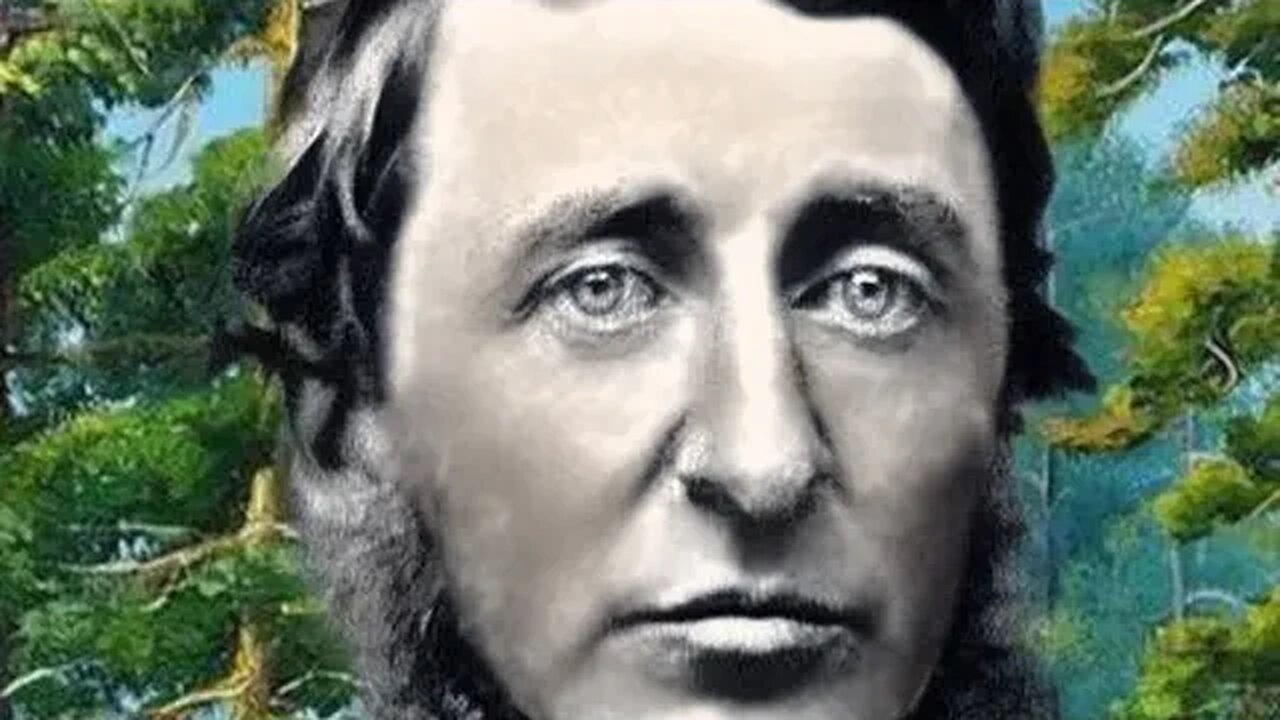Premium Only Content

Eternity In Each Moment
Come to the edge of transcendentalism for this Literati Short featuring Thoreau's Life in the Woods Excerpts set to profoundly liberating visuals.
Henry David Thoreau began writing nature poetry in the 1840s, with poet Ralph Waldo Emerson as a mentor and friend. In 1845 he began his famous two-year stay on Walden Pond, which he wrote about in his masterwork, Walden. He also became known for his beliefs in Transcendentalism and civil disobedience and was a dedicated abolitionist.
Early Life
One of America's most famous writers, Henry David Thoreau is remembered for his philosophical and naturalist writings. He was born and raised in Concord, Massachusetts, along with his older siblings John and Helen and younger sister Sophia. His father operated a local pencil factory, and his mother rented out parts of the family's home to boarders.
A bright student, Thoreau eventually went to Harvard College (now Harvard University). There he studied Greek and Latin as well as German. According to some reports, Thoreau had to take a break from his schooling for a time because of illness. He graduated from college in 1837 and struggled with what do to next. At the time, an educated man like Thoreau might pursue a career in law or medicine or in the church. Other college graduates went into education, a path he briefly followed. With his brother John, he set up a school in 1838. The venture collapsed a few years later after John became ill. Thoreau then went to work for his father for a time.
Emerson acted as a mentor to Thoreau and supported him in many ways. For a time, Thoreau lived with Emerson as a caretaker for his home. Emerson also used his influence to promote Thoreau's literary efforts. Some of Thoreau's first works were published in The Dial, a Transcendentalist magazine. And Emerson gave Thoreau access to the lands that would inspire one of his greatest works.
Walden
In 1845, Thoreau built a small home for himself on Walden Pond, on property owned by Emerson. He spent more than two years there. Seeking a simpler type of life, Thoreau flipped the standard routine of the times. He experimented with working as little as possible rather than engage in the pattern of six days on with one day off. Sometimes Thoreau worked as a land surveyor or in the pencil factory. He felt that this new approach helped him avoid the misery he saw around him. "The mass of men lead lives of quiet desperation," Thoreau once wrote.
His schedule gave him plenty of time to devote to his philosophical and literary interests. Thoreau worked on A Week on the Concord and Merrimack Rivers (1849). The book drew from a boating trip he took with his brother John in 1839. Thoreau eventually started writing about his Walden Pond experiment as well. Many were curious about his revolutionary lifestyle, and this interest provided the creative spark for a collection of essays. Published in 1854, Walden; or, Life in the Woods espoused living a life close to nature. The book was a modest success, but it wasn't until much later that the book reached a larger audience. Over the years, Walden has inspired and informed the work of naturalists, environmentalists and writers.
While living at Walden Pond, Thoreau also had an encounter with the law. He spent a night in jail after refusing to pay a poll tax. This experience led him to write one of his best-known and most influential essays, "Civil Disobedience" (also known as "Resistance to Civil Government"). Thoreau held deeply felt political views, opposing slavery and the Mexican-American War. He made a strong case for acting on one's individual conscience and not blindly following laws and government policy. "The only obligation which I have a right to assume is to do at any time what I think right," he wrote.
Since its publication in 1849, "Civil Disobedience" has inspired many leaders of protest movements around the world. This non-violent approach to political and social resistance has influenced American civil rights movement activist Martin Luther King Jr. and Mohandas Gandhi, who helped India win independence from Great Britain, among many others.
Later Years
Thoreau also remained a devoted abolitionist until the end of his life. To support his cause, he wrote several works, including the 1854 essay "Slavery in Massachusetts." Thoreau also took a brave stand for Captain John Brown, a radical abolitionist who led an uprising against slavery in Virginia. He and his supporters raided a federal arsenal in Harpers Ferry to arm themselves in October 1859, but their plan was thwarted. An injured Brown was later convicted of treason and put to death for his crime. Thoreau rose to defend him with the speech "A Plea for Capt. John Brown," calling him "an angel of light" and "the bravest and humanest man in all the country."
-
 1:00
1:00
Literati
1 year agoAwakening
81 -
 5:43:44
5:43:44
Scammer Payback
2 days agoCalling Scammers Live
117K19 -
 18:38
18:38
VSiNLive
1 day agoProfessional Gambler Steve Fezzik LOVES this UNDERVALUED Point Spread!
90K14 -
 LIVE
LIVE
Right Side Broadcasting Network
10 days agoLIVE REPLAY: President Donald J. Trump Keynotes TPUSA’s AmFest 2024 Conference - 12/22/24
5,654 watching -
 4:31
4:31
CoachTY
20 hours ago $19.28 earnedCOINBASE AND DESCI !!!!
97.8K9 -
 10:02
10:02
MichaelBisping
20 hours agoBISPING: "Was FURY ROBBED?!" | Oleksandr Usyk vs Tyson Fury 2 INSTANT REACTION
47.2K12 -
 8:08
8:08
Guns & Gadgets 2nd Amendment News
2 days ago16 States Join Forces To Sue Firearm Manufacturers Out of Business - 1st Target = GLOCK
84.5K86 -
 10:17
10:17
Dermatologist Dr. Dustin Portela
2 days ago $17.24 earnedOlay Cleansing Melts: Dermatologist's Honest Review
127K10 -
 1:02:20
1:02:20
Trumpet Daily
2 days ago $39.71 earnedObama’s Fake World Comes Crashing Down - Trumpet Daily | Dec. 20, 2024
85.1K58 -
 6:29
6:29
BIG NEM
1 day agoCultivating God Mode: Ancient Taoist NoFap Practices
63.2K13